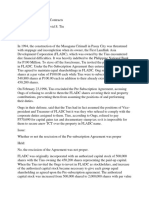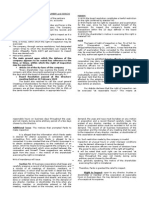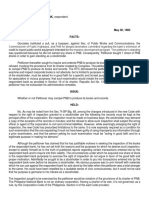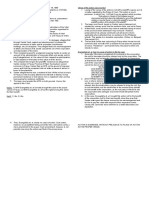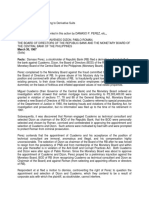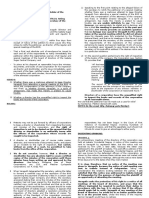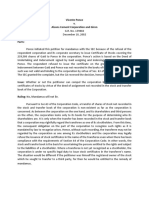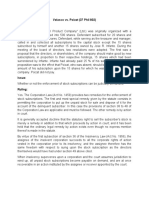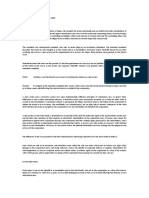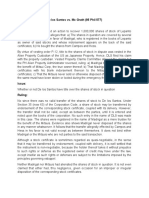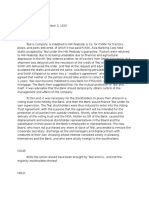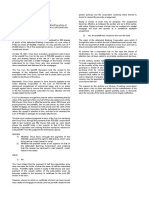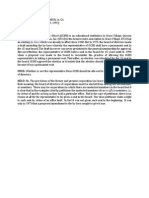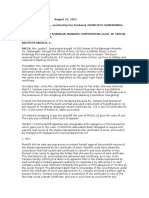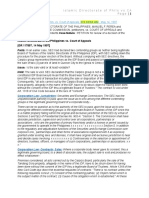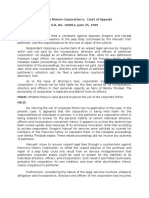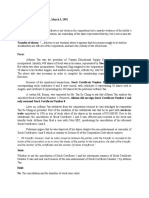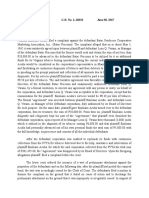Gonzales Vs PNB
Gonzales Vs PNB
Uploaded by
nievilleCopyright:
Available Formats
Gonzales Vs PNB
Gonzales Vs PNB
Uploaded by
nievilleOriginal Title
Copyright
Available Formats
Share this document
Did you find this document useful?
Is this content inappropriate?
Copyright:
Available Formats
Gonzales Vs PNB
Gonzales Vs PNB
Uploaded by
nievilleCopyright:
Available Formats
Gonzales vs PNB 122 SCRA 489 FACTS: Gonzales instituted a suit, as a taxpayer, against Sec.
of Public Works and Communications, the Commissioner of Public Highways, and PNB for alleged anomalies committed regarding the banks extension of credit to import public works equipment intended for the massive development program. The petitioners standing was questioned because he did not owned any share in PNB. Consequently, Petitioner bought 1 share of PNB stocks in order to gain standing as a stockholder. Petitioner thereafter sought to inquire and ordered PNB to produce its books and records which the Bank refused, invoking the provisions from its charter created by Congress. The petitioner filed petition for mandamus to compel PNB to produce its books and records. The RTC dismissed the petition and it ruled that the right to examine and inspect corporate books is not absolute, but is limited to purposes reasonably related to the interest of the stockholder, must be asked for in good faith for a specific and honest purpose and not gratify curiosity or for speculative or vicious purposes; that such examination would violate the confidentiality of the records of the respondent bank as provided in Section 16 of its charter, Republic Act No. 1300, as amended; and that the petitioner has not exhausted his administrative remedies. ISSUE: Whether or not Petitioner may compel PNB to produce its books and records HELD: No. As may be noted from the Sec 74 BP Blg. 68, among the changes introduced in the new Code with respect to the right of inspection granted to a stockholder are the following the records must be kept at the principal office of the corporation; the inspection must be made on business days; the stockholder may demand a copy of the excerpts of the records or minutes; and the refusal to allow such inspection shall subject the erring officer or agent of the corporation to civil and criminal liabilities. However, while seemingly enlarging the right of inspection, the new Code has prescribed limitations to the same. It is now expressly required as a condition for such examination that the one requesting it must not have been guilty of using improperly any information through a prior examination, and that the person asking for such examination must be "acting in good faith and for a legitimate purpose in making his demand." Although the petitioner has claimed that he has justifiable motives in seeking the inspection of the books of the respondent bank, he has not set forth the reasons and the purposes for which he desires such inspection, except to satisfy himself as to the truth of published reports regarding certain transactions entered into by the respondent bank and to inquire into their validity. The circumstances under which he acquired one share of stock in the respondent bank purposely to exercise the right of inspection do not argue
in favor of his good faith and proper motivation. Admittedly he sought to be a stockholder in order to pry into transactions entered into by the respondent bank even before he became a stockholder. His obvious purpose was to arm himself with materials which he can use against the respondent bank for acts done by the latter when the petitioner was a total stranger to the same. He could have been impelled by a laudable sense of civic consciousness, but it could not be said that his purpose is germane to his interest as a stockholder. The inspection sought to be exercised by the petitioner would be violative of the provisions of its charter of PNB. The Philippine National Bank is not an ordinary corporation. Having a charter of its own, it is not governed, as a rule, by the Corporation Code of the Philippines. Section 4 of the said Code provides: SEC. 4. Corporations created by special laws or charters. Corporations created by special laws or charters shall be governed primarily by the provisions of the special law or charter creating them or applicable to them. supplemented by the provisions of this Code, insofar as they are applicable. The provision of Section 74 of Batas Pambansa Blg. 68 of the new Corporation Code with respect to the right of a stockholder to demand an inspection or examination of the books of the corporation may not be reconciled with the abovequoted provisions of the charter of the respondent bank. It is not correct to claim, therefore, that the right of inspection under Section 74 of the new Corporation Code may apply in a supplementary capacity to the charter of the respondent bank.
You might also like
- Thabiso Yvonne Dzena - Decline LetterDocument1 pageThabiso Yvonne Dzena - Decline Letterdavidmashiya12No ratings yet
- Mishna BeruraDocument6 pagesMishna Berurajose contrerasNo ratings yet
- Ong Yong Vs Tiu G.R. No. 144476 Corpo DigestDocument2 pagesOng Yong Vs Tiu G.R. No. 144476 Corpo DigestAstrid Gopo Brisson83% (6)
- Pardo vs. Hercules LumberDocument2 pagesPardo vs. Hercules LumberSimon James Semilla100% (2)
- Henry Fleischer Vs Botica NolascoDocument2 pagesHenry Fleischer Vs Botica NolascoCharmila Siplon100% (1)
- 149 - PNB vs. Bitulok SawmillDocument1 page149 - PNB vs. Bitulok Sawmillmimiyuki_No ratings yet
- Marvel Building Corporation v. DavidDocument2 pagesMarvel Building Corporation v. Davidkim_santos_20No ratings yet
- Valle Verde Country Club v. AfricaDocument2 pagesValle Verde Country Club v. AfricaRap Santos100% (1)
- Gonzales vs. PNB (G.R. No. L-33320) CASE DIGESTDocument2 pagesGonzales vs. PNB (G.R. No. L-33320) CASE DIGESTEricha Joy GonadanNo ratings yet
- Eugenio Veraguth Vs Isabela Sugar CompanyDocument1 pageEugenio Veraguth Vs Isabela Sugar CompanyAnonymous SuujlHvfqNo ratings yet
- Pardo Vs Hercules LumberDocument2 pagesPardo Vs Hercules LumberNic Nalpen100% (1)
- 156 - Associated Bank vs. CADocument2 pages156 - Associated Bank vs. CAmimiyuki_100% (2)
- 02) Evangelista V SantosDocument2 pages02) Evangelista V SantosAlfonso Miguel Lopez100% (1)
- Rural Bank of Salinas Vs CADocument1 pageRural Bank of Salinas Vs CAXing Keet LuNo ratings yet
- Ponce Vs EncarnacionDocument1 pagePonce Vs EncarnacionLiaa Aquino100% (1)
- Republic Bank Vs CuadernoDocument2 pagesRepublic Bank Vs CuadernoTeacherEli100% (1)
- Veraguth Vs Isabela Sugar CompanyDocument3 pagesVeraguth Vs Isabela Sugar CompanyAnonymous 5MiN6I78I0No ratings yet
- 96 - Evangelista vs. SantosDocument2 pages96 - Evangelista vs. Santosmimiyuki_100% (1)
- 095 Lee Vs CADocument2 pages095 Lee Vs CAjoyce100% (3)
- San Miguel Corporation VsDocument2 pagesSan Miguel Corporation VsJay-ar Teodoro100% (1)
- Vicente Ponce vs. Alsons Cement Corporation (GR No. 139802 10 December 2002Document3 pagesVicente Ponce vs. Alsons Cement Corporation (GR No. 139802 10 December 2002Rivera Meriem Grace MendezNo ratings yet
- Republic Vs Sandiganbayan Case DigestDocument2 pagesRepublic Vs Sandiganbayan Case DigestBenok CaliNo ratings yet
- 148) Reyes Vs TanDocument2 pages148) Reyes Vs TanChaNo ratings yet
- National Exchange V DexterDocument1 pageNational Exchange V DexterReghz De Guzman PamatianNo ratings yet
- Yu Vs YukayguanDocument1 pageYu Vs YukayguanLindsay MillsNo ratings yet
- 169 Gov - T Vs Phil. Sugar EstateDocument1 page169 Gov - T Vs Phil. Sugar Estatemimiyuki_100% (1)
- Non Stock Corporation To Close CorporationsDocument7 pagesNon Stock Corporation To Close CorporationsMP Manliclic100% (1)
- Vicente Ponce v. Alsons Cement Corporation and GironDocument1 pageVicente Ponce v. Alsons Cement Corporation and GironCheCheNo ratings yet
- NIDC vs. AquinoDocument1 pageNIDC vs. AquinoJanlo FevidalNo ratings yet
- Velasco vs. Poizat (37 Phil 802)Document3 pagesVelasco vs. Poizat (37 Phil 802)Rivera Meriem Grace Mendez100% (1)
- Richardson vs. Arizona Fuels CorpDocument2 pagesRichardson vs. Arizona Fuels Corpเจียนคาร์โล การ์เซีย100% (1)
- Buenaflor vs. Camarines Sur Industry Corp.Document2 pagesBuenaflor vs. Camarines Sur Industry Corp.เจียนคาร์โล การ์เซียNo ratings yet
- GAMBOA V VictorianoDocument2 pagesGAMBOA V VictorianoMiguel Castriciones50% (2)
- Luneta Motor v. A.D. Santos DigestDocument2 pagesLuneta Motor v. A.D. Santos DigestAnit EmersonNo ratings yet
- Associated Bank Vs Court of AppealsDocument2 pagesAssociated Bank Vs Court of AppealsmyschNo ratings yet
- De Silva v. Aboitiz DIGESTDocument3 pagesDe Silva v. Aboitiz DIGESTkathrynmaydeveza100% (1)
- Lanuza Vs CADocument3 pagesLanuza Vs CALiaa Aquino100% (2)
- De Los Santos vs. MC Grath (95 Phil 577)Document1 pageDe Los Santos vs. MC Grath (95 Phil 577)Rivera Meriem Grace MendezNo ratings yet
- Expert Travel vs. CA DigestDocument4 pagesExpert Travel vs. CA DigestPaolo Adalem100% (1)
- Nava v. Peers MarketingDocument2 pagesNava v. Peers MarketingAnonymous 5MiN6I78I0No ratings yet
- Everett Vs AsiaDocument2 pagesEverett Vs Asiamonale_morenoNo ratings yet
- Phil Trust Co Vs Rivera Case DigestDocument1 pagePhil Trust Co Vs Rivera Case DigestRaje Paul Artuz100% (1)
- Fua Cun vs. SummersDocument1 pageFua Cun vs. SummersElreen Pearl AgustinNo ratings yet
- Grace Christian High School Vs CADocument1 pageGrace Christian High School Vs CAIan Jala Calmares0% (1)
- Garcia Vs SuarezDocument2 pagesGarcia Vs SuarezChammyNo ratings yet
- CORPO, Santamaria Vs HongkongDocument2 pagesCORPO, Santamaria Vs HongkongReina Habijan100% (1)
- De La Rama Et Al Vs Ma-Ao Sugar CentralDocument17 pagesDe La Rama Et Al Vs Ma-Ao Sugar CentralSTEPHEN M. LAYSONNo ratings yet
- Alhambra Cigar vs. SECDocument2 pagesAlhambra Cigar vs. SECLilibeth Dee Gabutero67% (3)
- Uson Vs DiosomitoDocument1 pageUson Vs DiosomitoCJNo ratings yet
- Islamic Directorate of The Phils V CA DigestDocument2 pagesIslamic Directorate of The Phils V CA Digestmaanyag6685No ratings yet
- Francisco Motors v. Court of AppealsDocument2 pagesFrancisco Motors v. Court of AppealsYolanda Janice Sayan FalingaoNo ratings yet
- People's Aircargo vs. CADocument2 pagesPeople's Aircargo vs. CATawana Holmes100% (2)
- Tan Vs Sec DigestDocument2 pagesTan Vs Sec DigestRyan Suaverdez100% (1)
- Acuna V Batac ProducersDocument3 pagesAcuna V Batac ProducersPablo Jan Marc Filio100% (1)
- CIR Vs Club Filipino DigestDocument2 pagesCIR Vs Club Filipino DigestJC100% (2)
- San Miguel vs. Khan (Valera)Document2 pagesSan Miguel vs. Khan (Valera)ASGarcia24No ratings yet
- PNB Vs Bitulok Sawmill DigestDocument1 pagePNB Vs Bitulok Sawmill DigestMarry LasherasNo ratings yet
- National Exchange vs. DexterDocument1 pageNational Exchange vs. DexterCindee YuNo ratings yet
- Villamor JR V UmaleDocument2 pagesVillamor JR V UmaleSocNo ratings yet
- SECTION 74 Corporation Code Gonzales Vs PNB FactsDocument2 pagesSECTION 74 Corporation Code Gonzales Vs PNB Factshmn_scribdNo ratings yet
- Corpo Cases 7Document17 pagesCorpo Cases 7Garri AtaydeNo ratings yet
- Gonzales vs. PNBDocument4 pagesGonzales vs. PNBLenPalatanNo ratings yet
- Bassam AbdulwahabDocument14 pagesBassam Abdulwahabalaatrans1No ratings yet
- What Is Happening To Our Beautiful LandDocument3 pagesWhat Is Happening To Our Beautiful LandVERA FilesNo ratings yet
- BWM 4103 Islamic Treasury Management Quiz 2&quiz 3Document5 pagesBWM 4103 Islamic Treasury Management Quiz 2&quiz 3Nabila SyahirahNo ratings yet
- Varun Resources Annual Report 2014-15Document101 pagesVarun Resources Annual Report 2014-15amitsi1974No ratings yet
- Falcon DynamicsDocument2 pagesFalcon DynamicsNasrul Nabil SangadjiNo ratings yet
- PIAMA27Document375 pagesPIAMA27Rex TyrannosaurNo ratings yet
- Presidential Decree No 1160Document2 pagesPresidential Decree No 1160Owie JoeyNo ratings yet
- Flag Carrier: National Carrier, Although This Can Have Different Legal Meanings in SomeDocument29 pagesFlag Carrier: National Carrier, Although This Can Have Different Legal Meanings in SomeKonstantinos Stampoulis100% (1)
- Sun Tzu Police BrutalityDocument3 pagesSun Tzu Police BrutalityAlix SwannNo ratings yet
- 11 Business Studies23 24sp01Document12 pages11 Business Studies23 24sp01Tech with Tesu100% (1)
- Fly Me To The MoonDocument3 pagesFly Me To The MoontillyronayNo ratings yet
- Pre Qualifier PG MGMTDocument7 pagesPre Qualifier PG MGMTsfarithaNo ratings yet
- Specific PerformanceDocument13 pagesSpecific PerformanceSyahmi SyahiranNo ratings yet
- Unit III MCQ Thermometry and Fiber OpticsDocument18 pagesUnit III MCQ Thermometry and Fiber OpticsUmesh PatilNo ratings yet
- Jharkhand Victim Compensation Scheme 2012Document5 pagesJharkhand Victim Compensation Scheme 2012Latest Laws Team100% (1)
- Reception For Mitt RomneyDocument2 pagesReception For Mitt RomneySunlight FoundationNo ratings yet
- A Song For Assata-TDocument4 pagesA Song For Assata-Tapi-508141563No ratings yet
- Lick_09_tabDocument5 pagesLick_09_tabumitNo ratings yet
- A Heretic's Guide To Ideological Subversion: ResearchDocument11 pagesA Heretic's Guide To Ideological Subversion: ResearchpauloalaraNo ratings yet
- The Formation of Central America - Marjorie AndradeDocument14 pagesThe Formation of Central America - Marjorie AndradeMarjorie AndradeNo ratings yet
- Rynearson v. Ferguson Et Al First Amendment CyberstalkingDocument8 pagesRynearson v. Ferguson Et Al First Amendment Cyberstalkingchristopher kingNo ratings yet
- WdawdawdDocument14 pagesWdawdawdfaheemafridiNo ratings yet
- Office of The Chief Dist - Medical Officer: Mayurbhanj. No. 6260 /baripada, The 14 Th. July.2015Document5 pagesOffice of The Chief Dist - Medical Officer: Mayurbhanj. No. 6260 /baripada, The 14 Th. July.2015JeshiNo ratings yet
- Manila Jockey Club Employees Labor Union vs. Manila Jockey Club Inc GR No. 167760, March 7, 2007Document2 pagesManila Jockey Club Employees Labor Union vs. Manila Jockey Club Inc GR No. 167760, March 7, 2007AP CruzNo ratings yet
- Polymer Rubber Corporation vs. SalamudingDocument3 pagesPolymer Rubber Corporation vs. SalamudingRomy IanNo ratings yet
- PrashantSahdevParab - Database Monitoring Analyst - Pune - MphasisDocument3 pagesPrashantSahdevParab - Database Monitoring Analyst - Pune - MphasisSoniya chaudharyNo ratings yet
- Study On How Dark Web Facilitate Cyber Security Experts To Improve Business SecuritDocument8 pagesStudy On How Dark Web Facilitate Cyber Security Experts To Improve Business SecuritIJRASETPublicationsNo ratings yet
- Hardware Design With rp2040Document31 pagesHardware Design With rp2040luigiesnNo ratings yet


